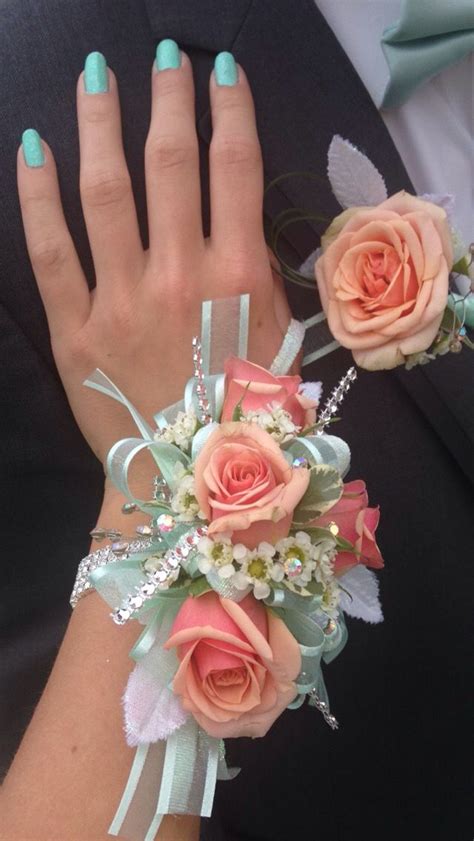Accessorizing any formal attire for a special occasion can be quite daunting, especially when it comes to wearing a corsage. However, with the right technique and a little practice, you can master the art of putting on a corsage with grace and elegance.

Choosing the Perfect Corsage
Before diving into the intricacies of corsage placement, it’s essential to select the right corsage that complements both your outfit and your personal style. Consider the following factors:
- Dress Style: Choose a corsage that harmonizes with the neckline of your dress. For example, a round or cascade corsage works well with a sweetheart neckline, while a wrist corsage is suitable for a sleeveless dress.
- Color and Fabric: Match the colors and textures of the corsage to your dress. Opt for a corsage that enhances the overall aesthetic without overpowering it.
- Personal Preferences: Ultimately, the best corsage is the one that makes you feel confident and beautiful. Consider your favorite flowers, colors, and designs to find the perfect fit.
Preparing Your Corsage
Once you’ve selected your corsage, prepare it for placement by following these steps:
- Trim the Stems: Using sharp scissors, trim the stems of the flowers to a manageable length. This will make it easier to secure the corsage.
- Add Florist’s Tape: Wrap florist’s tape around the base of the corsage to create a secure grip. This will prevent the flowers from falling out of place.
- Attach a Ribbon or Pin: If your corsage doesn’t come with a ribbon or pin, attach one to the back using florist’s wire. This will be used to fasten the corsage to your dress.
Putting on Your Corsage
With your corsage prepared, it’s time to don it with confidence:
- Identify the Placement: Typically, corsages are worn on the left shoulder or wrist. Determine which placement best complements your attire.
- Secure the Pin or Ribbon: For a shoulder corsage, position it on your left shoulder and secure the pin or ribbon through the fabric of your dress. For a wrist corsage, wrap the ribbon around your wrist and tie it securely.
- Adjust the Length: If necessary, adjust the length of the ribbon or pin to ensure the corsage is at the desired height.
- Check Your Posture: Stand up straight and check that the corsage complements your posture. Make any necessary adjustments to ensure it doesn’t interfere with your movement.
Tips and Tricks for a Flawless Finish
- Practice Makes Perfect: Familiarize yourself with the process by practicing with a fake corsage or flowers.
- Use Magnets: Attach small magnets to the back of the corsage to securely hold it in place without damaging your dress.
- Accessorize with Jewelry: Pair your corsage with complementary jewelry, such as a bracelet or brooch, to enhance the overall look.
- Consider the Weather: If wearing your corsage outdoors, choose flowers that are weather-resistant to prevent wilting.
- Ask for Help: If you’re unsure about the placement or securement of your corsage, ask a friend or family member for assistance.
Frequently Asked Questions
Q: Can I wear a corsage on my right shoulder?
A: While it’s uncommon, some individuals may choose to wear their corsage on their right shoulder. The decision depends on personal preference and the style of the attire.
Q: How do I keep my corsage fresh?
A: To maintain the freshness of your corsage, store it in a cool and humid environment, such as a refrigerator. Avoid exposing it to direct sunlight or heat.
Q: Can I reuse my corsage?
A: Depending on the type of flowers used, it may be possible to reuse your corsage. However, delicate flowers may not withstand multiple uses.
Q: What do I do with my corsage after the event?
A: Traditionally, the person who gives you the corsage keeps it as a memento. You can also press the flowers from the corsage to preserve the memory.
Conclusion
Mastering the art of putting on a corsage is a valuable skill that enhances your elegance and poise for any formal occasion. By following these steps and incorporating the tips provided, you can confidently wear your corsage with style and grace, leaving a lasting impression on your special day.
Table 1: Types of Corsages
| Type | Description |
|---|---|
| Shoulder Corsage | Worn on the left shoulder, secured with a pin or ribbon |
| Wrist Corsage | Worn around the wrist, tied with a ribbon |
| Headpiece Corsage | Worn in the hair, attached with bobby pins |
| Boutonniere Corsage | Worn on the lapel of a suit or dress |
| Diffuser Corsage | Emits a pleasant fragrance |
Table 2: Corsage Flower Choices
| Flower | Characteristics |
|---|---|
| Roses | Classic and elegant, available in various colors |
| Orchids | Exotic and sophisticated, known for their longevity |
| Lilies | Graceful and fragrant, representing purity and innocence |
| Peonies | Romantic and lush, symbolizing prosperity and beauty |
| Hydrangeas | Voluminous and bountiful, representing gratitude and abundance |
Table 3: Wedding Corsage Traditions
| Person | Corsage Type |
|---|---|
| Bride | White or ivory corsage with cascading flowers |
| Groom | Matching boutonniere |
| Bridesmaids | Smaller versions of the bride’s corsage |
| Groomsmen | Boutonnieres |
| Mothers of the Bride and Groom | Wrist or shoulder corsages |
Table 4: Corsage Care and Handling
| Aspect | Tips |
|---|---|
| Storage | Keep in a cool, humid environment, such as a refrigerator |
| Handling | Avoid squeezing or crushing the flowers |
| Hydration | Spray with water periodically to keep them fresh |
| Transportation | Use a corsage box or vase with water for long-distance travel |
| Disposal | Compost or press the flowers as a keepsake |
